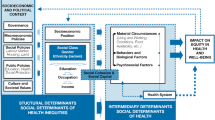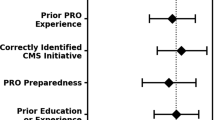Abstract
Objective
Measurement-based care (MBC) refers to the routine use of symptom rating scales to guide treatment decisions. Although effective, it is an underused approach to enhance patient care. A significant barrier to integration of MBC is insubstantial foundational training. This scoping review aims to survey the literature on MBC educational curricula for mental health trainees.
Methods
Investigators searched Ovid Medline, PsycINFO, Embase, Cochrane Central, and Ebsco CINAHL through June 2021 to select records that described studies of MBC educational programs for undergraduate, graduate, or postgraduate learners in mental healthcare.
Results
From 1270 unique records, 1263 were excluded in abstract/title and full-text screening. This scoping review included seven articles, of which most were empirical or case studies and took place in the USA. These curricula involved many delivery formats, including lectures and in-service training. Measured learner outcomes include those that are learner-focused (i.e. learner reaction, or attitudinal/behavioral change) and organizational-focused (i.e. increased clinical use of MBC). Mechanisms of positive outcomes are posited to include enhanced stakeholder support and continual curriculum improvement.
Conclusions
MBC curricula can be taught in various formats to diverse learners in mental healthcare. Contextual factors, such as dedicated resources, MBC champions, supervisor training, online measurement feedback systems, simple measures, and gathering and disseminating feedback may facilitate curricular success by fostering stakeholder support and continual program improvement. To address literature gaps, future research in MBC education should involve educational frameworks in designing curriculum and address the use of quality improvement approaches in the implementation of MBC education.

Similar content being viewed by others
Data Availability
The dataset generated for the current study are available from the corresponding author on reasonable request.
References
Fortney JC, Unutzer J, Wrenn G, et al. A tipping point for measurement-based care. Psychiatr Serv. 2016;68(2):179–88.
Scott K, Lewis CC. Using measurement-based care to enhance any treatment. Cogn Behave Pract. 2015;22(1):49–59.
Guo T, Xiang Y-T, Xiao L, et al. Measurement-based care versus standard care for major depression: a randomized controlled trial with blind raters. Am J Psychiatry. 2015;172(10):1004–13.
Aboraya A, Nasrallah HA, Elswick DE, et al. Measurement-based care in psychiatry - past, present, and future. Innov Clin Neurosci. 2018;15(11–12):13–26.
Katon WJ, Lin EHB, Von Korff M, et al. Collaborative care for patients with depression and chronic illnesses. N Engl J Med. 2010;363(27):2611–20.
Gondek D, Edbrooke-Childs J, Fink E, et al. Feedback from outcome measures and treatment effectiveness, treatment efficiency, and collaborative practice: a systematic review. Adm Policy Ment Health. 2016;43(3):325–43.
Tam HE, Ronan K. The application of feedback-informed approach in psychological service with youth: systematic review and meta-analysis. Clin Psychol Rev. 2017;55:41–55.
Lambert MJ, Whipple JL, Hawkins EJ, et al. Is it time for clinicians to routinely track patient outcome? A meta-analysis. Clin Psychol Sci Pract. 2006;10(3):288–301.
Lewis CC, Boyd M, Pspitasari A, et al. Implementing measurement-based care in behavioral health. JAMA Psychiat. 2019;76(3):324–55.
Crits-Christoph P, Ring-Kurtz S, Hamilton JL, et al. A preliminary study of the effects of individual patient-level feedback in outpatient substance abuse treatment programs. J Subst Abuse Treat. 2012;42(3):301–9.
Bickman L, Kelley SD, Breda C, et al. Effects of routine feedback to clinicians on mental health outcomes of youths: results of a randomized trial. Psychiatr Serv. 2011;62:1423–9.
Trivedi MH, Rush AJ, Wisniewski SR, et al. Evaluation of outcomes with citalopram for depression using measurement-based care in STAR*D: implications for clinical practice. Am J Psychiatry. 2006;163:28–40.
Dowrick C, Leydon GM, McBride A, et al. Patients’ and doctors’ views on depression severity questionnaires incentivised in UK quality and outcomes framework: qualitative study. BMJ. 2009;338:b663.
Cuperfain AB, Hui K, Berkhout SG, et al. Patient, family and provider views of measurement-based care in an early psychosis intervention programme. BJPsych Open. 2021;7(5):e171.
Zimmerman M, McGlinchey JB. Why don’t psychiatrists use scales to measure outcome when treating depressed patients? J Clin Psychiatry. 2008;69:1916–9.
Jensen-Doss A, Haimes EMB, Smith AM, et al. Monitoring treatment progress and providing feedback is viewed favorably but rarely used in practice. Adm Policy Ment Health. 2018;45(1):48–61.
Arbuckle MR, Weinberg M, Harding KJ, et al. The feasibility of standardized patient assessments as a best practice in an academic training program. Psychiatr Serv. 2013;64:209–11.
Munn Z, Peters MDJ, Stern C, et al. Systematic review or scoping review? Guidance for authors when choosing between a systematic or scoping review approach. BMC Med Res Methodol. 2018;18:143.
Peters M, Godfrey C, McInerney P, et al. Chapter 11: Scoping reviews (2020 version). In: Aromataris E, Munn Z (Editors). JBI manual for evidence synthesis 2020. Available from: https://synthesismanual.jbi.global.
Tricco AC, Lillie E, Zarin W, et al. PRISMA extension for scoping reviews (PRISMA-ScR): checklist and explanation. Ann Intern Med. 2018;169:467–73.
Freedman DE, Waddell AE, Lam H, et al. Measurement-based care educational programmes for clinical trainees in mental healthcare: a scoping review protocol. BMJ Open. 2021;11:e054751.
Barr H, Freeth D., Hammick M, et al. Evaluations of inter professional education: a United Kingdom review for health and social care. Centre for the Advancement of Interprofessional Education in Primary Health and Community Care, 2000.
Pawson R, Tilley N. Realistic evaluation. London: Sage Publ; 1997.
Brown A, Lafreniere K, Freedman D, et al. A realist synthesis of quality improvement curricula in undergraduate and postgraduate medical education: what works, for whom, and in what contexts? BMJ Qual Saf. 2021;30(4):337–52.
Bendermacher GWG, oude Egbrink MGA, Wolfhagen IHAP, et al. Unravelling quality culture in higher education: a realist review. Higher Education 2017;73:39–60.
Pawson R, Greenhalgh T, Harvey G, et al. Realist review - a new method of systematic review designed for complex policy interventions. J Health Serv Res Policy. 2005;10(Suppl 1):21–34.
Arbuckle MR, Weinberg M, Kistler SC, et al. A curriculum in measurement-based care: screening and monitoring of depression in a psychiatric resident clinic. Acad Psychiatry. 2013;37(5):317–20.
Liu NH, Diamond AE, Gasperetti CE. Implementation of routine outcomes monitoring into a graduate training clinic: a case illustration. The Behavior Therapist. 2017;40(8):312–8.
Cooper LD, Murphy HG, Delk LA, et al. Implementing routine outcome monitoring in a psychology training clinic: a case study of a process model. Training and Education in Professional Psychology. 2021;15(2):87–96.
Brown MJ, Adams SM, Vanderhoef D, et al. Improving PHQ9 utilization rates in a primary care-mental health integration setting. J Am Psychiatr Nurses Assoc. 2020;26(2):206–11.
Collins C, Mohiuddin S, Kerlek A. Integrating measurement-based care into trainee education. Child Adolesc Psychiatr Clin N Am. 2020;29(4):755–62.
Peterson AP, Fagan C. Training the next generation in routine outcome monitoring: current practices in psychology training clinics. Training and Education in Professional Psychology. 2017;11(3):182–9.
Edbrooke-Childs J, Wolpert M, Deighton J. Using Patient Reported Outcome Measures to Improve Service Effectiveness (UPROMISE): training clinicians to use outcome measures in child mental health. Adm Policy Ment Health. 2016;43(3):302–8.
Kroenke K, Spitzer RL, Williams JB. The PHQ-9: validity of a brief depression severity measure. J Gen Intern Med. 2001;16(9):606–13.
Lovibond SH, Lovibond PF. Manual for the Depression Anxiety Stress Scales 2nd ed. Sydney: Psychology Foundation; 1995.
Üstün TB. Measuring health and disability: manual for WHO Disability Assessment Schedule WHODAS 2.0. Geneva: World Health Organization; 2010.
Greenhalgh J, Manzano A. Understanding ‘context’ in realist evaluation and synthesis. Int J Soc Res Methodol. 2021;25(5):583–95.
Bickman L, Kelley SD, Athay M. The technology of measurement feedback systems. Couple Family Psychol. 2012;1(4):274–84.
Astbury B, Leeuw F. Unpacking black boxes: mechanisms and theory building in evaluation. Am J Eval. 2010;31(3):363–81.
Mourad A, Jurjus A, Hussein IH. The what or the how: a review of teaching tools and methods in medical education. Med Sci Education. 2016;26:723–8.
Moir T. Why is implementation science important for intervention design and evaluation within educational settings? Frontiers in Education. 2018;3(61):1–9.
Santos WJ, Graham ID, Lalonde M, et al. The effectiveness of champions in implementing innovations in health care: a systematic review. Implementation Science Communications. 2022;3:80.
Langley GL, Nolan KM, Nolan TW, et al. The improvement guide: a practical approach to enhancing organizational performance. 2nd ed. San Francisco: Jossey-Bass; 2009.
Author information
Authors and Affiliations
Corresponding author
Ethics declarations
Disclosures
On behalf of all authors, the corresponding author states that there is no conflict of interest.
Additional information
Publisher's Note
Springer Nature remains neutral with regard to jurisdictional claims in published maps and institutional affiliations.
Rights and permissions
Springer Nature or its licensor (e.g. a society or other partner) holds exclusive rights to this article under a publishing agreement with the author(s) or other rightsholder(s); author self-archiving of the accepted manuscript version of this article is solely governed by the terms of such publishing agreement and applicable law.
About this article
Cite this article
Freedman, D.E., Waddell, A.E., Bourdon, A. et al. Educating Mental Health Trainees About Measurement-Based Care: A Scoping Review. Acad Psychiatry 47, 187–195 (2023). https://doi.org/10.1007/s40596-023-01749-x
Received:
Accepted:
Published:
Issue Date:
DOI: https://doi.org/10.1007/s40596-023-01749-x




